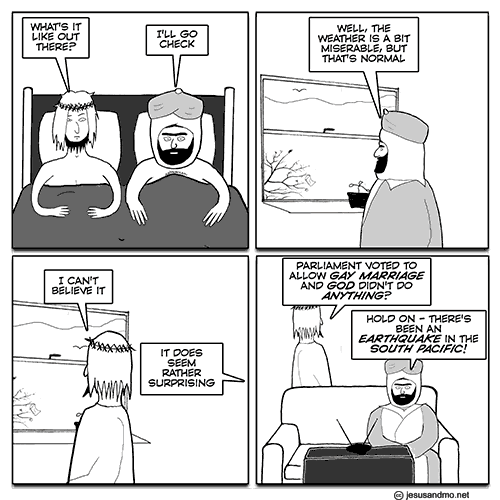The Executive Board of the Boy Scouts of America today decided to defer until its national meeting in May a decision on allowing local troops to decide whether they could admit gay members.
I am disappointed but not surprised at the deferral. The possibility of a change in BSA policy emerged just recently and as I wrote before, large religiously-oriented organizations tend not to move quickly on policy matters but slowly edge towards doing the right thing if it goes against their traditional ways of operating. You are going to see a determined effort by the Mormons, Catholics, and the evangelicals to lobby the 1400 voting members of the national meeting to vote against any change. They may well succeed this year but will surely lose in the near future.
Meanwhile, on a more positive note, the British parliament voted yesterday by a large margin of 400 to 175 to allow same-sex marriage.
Prime Minister David Cameron had pushed for the change in law to allow same-sex marriage but all parties had waived party discipline and given their party members freedom to vote as they wished. As a result, he could not get a majority within his own Conservative party and needed votes from his coalition ally the Liberal party and the opposition Labor party to pass it. 136 Conservatives voted against him, 127 with him, and 35 abstained.
I believe the bill now has to go to the House of Lords and be passed there before it becomes law. I have no idea how that body will vote, though I believe that even it votes no, the House of Commons can override it with another vote.
Jesus and Mo are worried by what did not happen after the vote.


A little clarification might be in order? Most of the following is my own understanding so probably has errors in the detail somewhere. If anyone is interested this is a more official source of how a bill becomes law in the UK (at Westminster anyway, Holyrood, Stormont and Cardiff all have their own peculiarities).
Yesterday the Marriage (same Sex Couples) Bill had it’s second reading in the Commons and now proceeds to the Committee stage. After that there’s a Report stage and a third reading at the end of which there will be a second Commons vote.
If it gets through all that (which it will unless more than 100 MPs suddenly decide to commit political suicide), it then moves to the Lords and goes through the whole palaver all over again (inital reading, 2nd reading with vote, committee stage, report stage, 3rd reading + vote).. If the Lords pass it, it then goes to the Queen for “Royal Assent” which is fundamentally a pointless rubber stamping.
If the Lords does vote it down (again unlikely, but IMO slightly less so), or if they attach amendments the Commons doesn’t like, the Commons can vote to send the Bill back to the Lords (or remove the changes and send it back). At one time Bills could go back and forth like this indefinitely, but the 1911 Parliament Act effectively removed the Lords power of veto. On the second rejection by the Lords, unless the Commons directs otherwise, the Speaker can sign the bill, attesting that it has met the provisions of the Parliament Act, and send it to the Queen.
In short, although there are theoretical ways in which the legislation could fail, with such a large commons majority (and also given opinion polls show about 70% of the country back it) it’s now 99.99% certain to be pass.
Thanks a lot for the explanation of bills become law in the UK. Pretty complicated but straightforward.
Whilst it is legal for the Parliament Act to be used to push through legislation in the face of continued opposition from the Lords, in practice it is not used unless at least two attempts have been made to get the act passed in the Lords in two separate Parliamentary sessions, unless the provisions of the act were part of the governing parties manifesto.